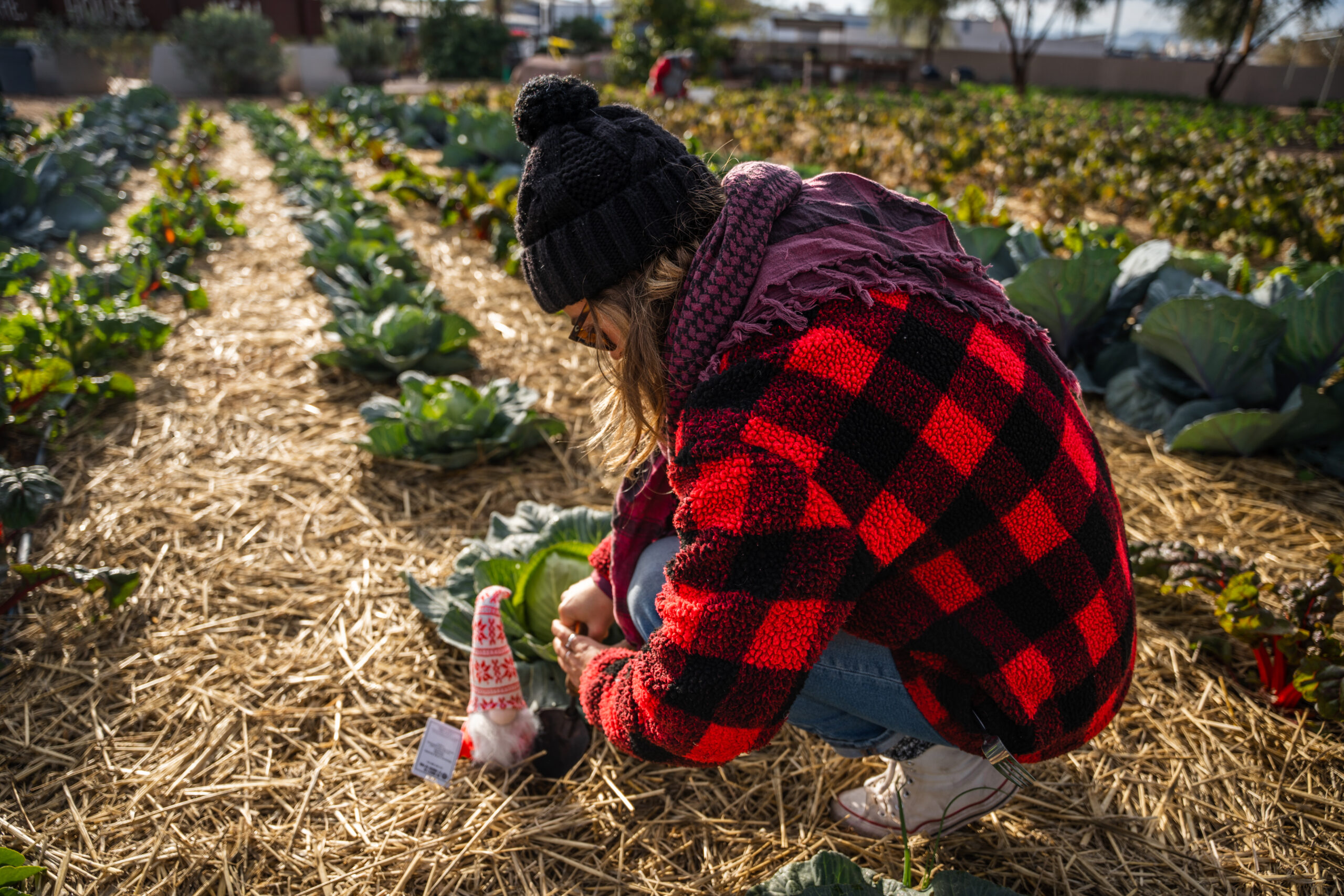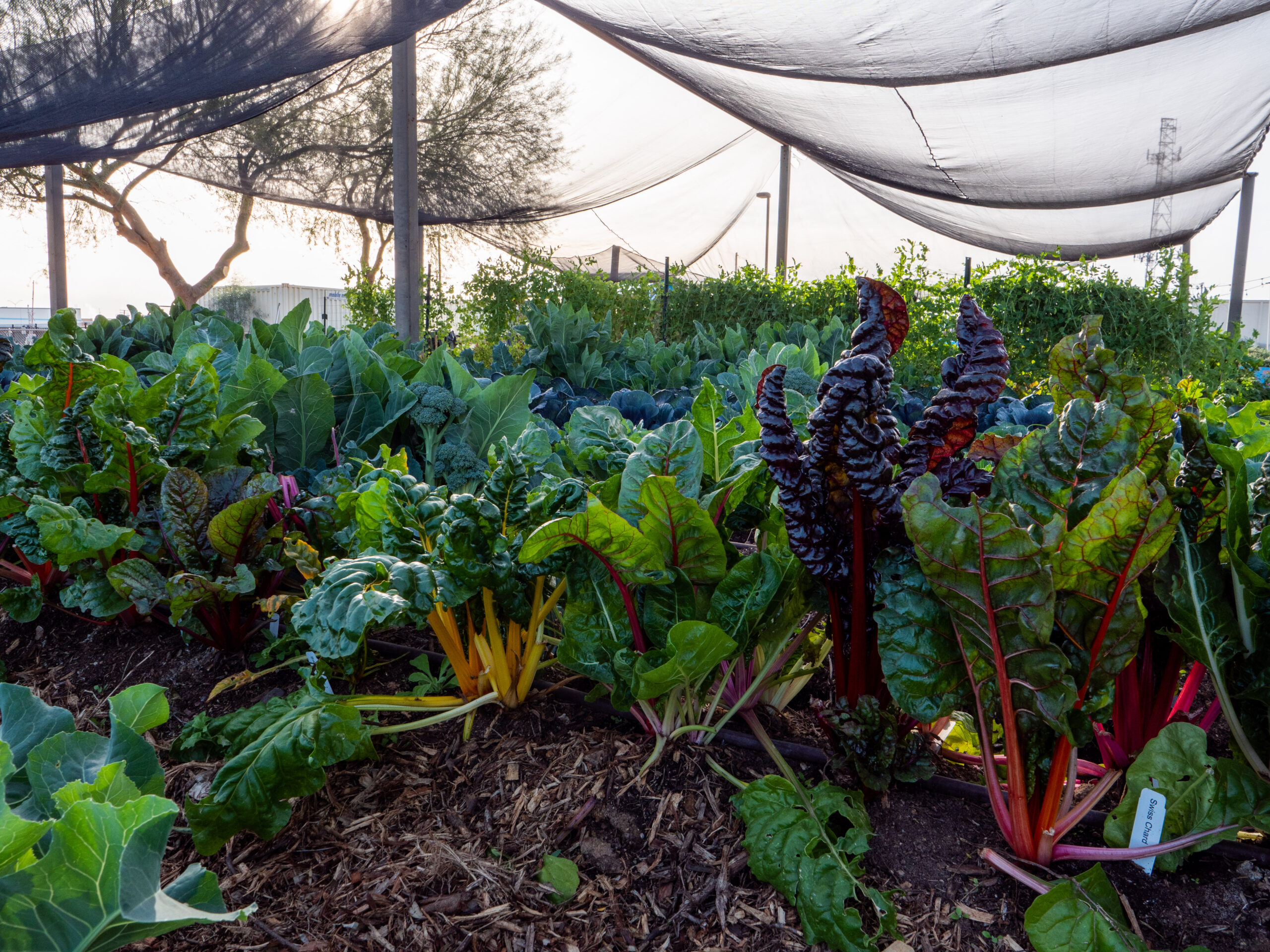When Nika Forte stepped onto one of St. Vincent de Paul’s urban farms in Phoenix eight years ago, she didn’t know her experience would one day bloom into a passion and a future career.
Farming had not been part of her youth growing up in Detroit and 25 volunteer hours on this farm would be required for her to obtain the urban farming certificate that would accompany her Mind, Body, Wellness, and Transformational Psychology degree from the Southwest Institute of Healing Arts. It didn’t take long for her and the other volunteers to figure out that they weren’t there to do light gardening. They pulled out old crops and moved heaps of heavy soil on a warm September day. It was hard work, but by day’s end, it was a good feeling.

Forte completed the required 25 hours for her certificate in one week, and soon she was a regular volunteer. As she earned her associate’s degree and began looking for work as a life coach, St. Vincent de Paul reached out to ask if she wanted to run one of the farms as a volunteer.
Her response was an emphatic, “Absolutely!” she said.
Forte served as an AmeriCorps ally for the first two years, helping with educational programming and starting a junior master gardeners program where she taught seed-saving and how to grow food in a container. Forte was then hired on as an intern and soon after promoted to program coordinator, then farm manager for her location, and eventually manager of all three farms. Today, she is St. Vincent de Paul’s director of urban farming.
St. Vincent de Paul is an international nonprofit that serves people in need through its various food pantries, charity dining rooms, transitional shelters, and resource centers. The organization also operates a nonprofit clinic offering medical, dental, and wellness care for uninsured individuals. The organization has helped people in central and northern Arizona since 1946.
Forte hasn’t been homeless, but she has been hungry, she said. As a former single mom, she’d ride the bus to the grocery store, kids in tow. She often was faced with the reality of needing to choose the foods that were most affordable versus the foods that were the most healthy in order to make ends meet, using what was left over for bus tickets and daycare.
“I know what it means to be food insecure, and in this country, we throw away so much food, and we waste so much food, and there’s no reason why anybody should go hungry,” she said. “But it happens. I’m just glad that I can be part of the solution to help end hunger.”
That fulfilling and amazing feeling of helping others is the reason why she gets up every day and heads to the farm.
“There’s nothing like putting a seed in the dirt, watching that plant grow, harvesting those vegetables, and then taking it into the dining room and seeing them eat it,” she said. “That is the most fulfilling and amazing feeling.”
In Phoenix, St. Vincent de Paul’s three urban vegetable farms help feed a population in need and educate people on growing their own produce. Produce, herbs, and edible flowers are the main features of the farms, along with a few orchards.
Beyond caring for the farms, Forte meets many different people, which is another reason she loves what she does. From young to old, volunteers and community members make up 98% of St. Vincent de Paul’s workforce.
“I’m doing something that can leave a lasting memory in some of these individuals’ lives, whether that’s the students that were in my junior master gardeners class or a donor that showed up to do a tour,” she said.
Sustainability plays a key role in keeping the farms going, especially in the hot summer months. Produce is grown by season, and most of the crops are watered at night on a timed drip system to conserve water and save money. Shade trees extend the growing season and shield plants from the sun during the hottest parts of the day. Seeds are saved from the plants that do their best throughout the year and are planted again the following year. On one of the farms, 23 chickens provide fertilizer, till the dirt, and provide an additional educational component in the junior master gardeners program. And in the spring, bees visit the lush garden to pollinate a bevy of flowers and native plants.
When there are enough volunteers, a composting program is used to break down scraps from the dining room and kitchen to feed the plants. Because composting takes a lot of skill, time, and patience, it’s not possible for just one full-time employee at each farm to manage. Currently, the program is paused but Forte notes that they’re working on collaborations with local college students in sustainability programs to bring the program back.
A Growing Future
Forte hopes for each farm to eventually have an educational greenhouse that will expand St. Vincent de Paul’s footprint in educational programming and community engagement through hands-on learning. Beyond teaching others, it’s a chance to give back to the community that supports the mission.
“Our goal is always to educate those on how to be more sustainable, how to be environmental stewards, how to grow your own food and be self-reliant,” she said.
She also wants to make sure that any available space is utilized creatively to its fullest potential, reenvisioning places to grow food that would not normally be used for that purpose.
For Forte, the farm has become an irreplaceable part of her life. She’d like to have her own farm one day where she and her husband can retire.
“You can’t get me out of the farm. Now I’m in the garden six to seven days out of the week,” she said.

More to Buzz About
Forte is also expanding her skill set by working with Baehive, a sisterhood of beekeeping women. She learned the basics of beekeeping at St. Vincent de Paul and continued her research to find that there were not a lot of women in the industry. Currently, the industry is dominated by men, mostly white. Baehive’s goal is to teach more women and women of color how to keep bees.
“I feel like when you teach a woman a skill, you’re teaching a civilization — our nation — a skill,” she said. “I wanted to build a sisterhood around beekeeping and just get more of us involved in beekeeping.”
The group of about 30 women mirrors the structure of a beehive, too. About 98% of the hive is female, and the bees work together to keep each other alive, fed, and happy — and everything they do is for the good of the colony as a whole. That’s what a sisterhood should be, Forte said.
Baehive’s purpose isn’t necessarily honey production, but if there’s an overflow of honey or if one of the boxes needs to be downsized, Forte sells the honey at the farmer’s market at the community garden she runs on her own or sells it at Grassrootz, a black-owned bookstore in Downtown Phoenix. The money goes right back into beehive production to continue the sisterhood.






